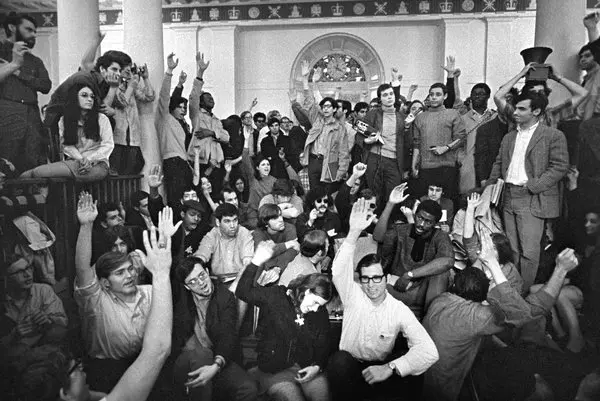An interesting phenomenon to be found in modern Western life is that of the student activists. Young people who are studying in colleges and universities, but whose focus is much more on situations and events that are occurring in the world beyond books and screen reality. Young people who have lived ordinary protected middle-class lives, and who decide that there is a problem in the external world that deserves a great deal of their attention. Frequently, it involves joining pre-existing organizations that are already carrying out various strategies to deal with the problem. For instance, organizations that fight anti-Semitism or that promote it. Organizations that fight racial prejudice or that promote it. Organizations that fight to end an unpopular war. Organizations that fight climate change. Organizations that are pro-choice or pro-life. Organizations that are for regulations of gun use or against them. Organizations that fight economic inequality. Sometimes students join organizations that are based strongly on particular political philosophies and that have set answers for a wide variety of social and political problems. Sometimes, these organizations want to keep the status quo, and sometimes they want to overturn it. Carry out a social revolution.
There is definitely tension between the living environment of academia which requires a certain amount of grounding in the external world to be able to concentrate on one’s studies in the somewhat mediated world of the mind, and the social revolutionary approach which wants to transform things in the world of primary experience.
I have always had some trouble in terms of how to place books on the spectrum between primary experience in the external world and the mediated experience created by modern technology, the mediated experience of screen reality. I have concluded that books are the most mediated manifestation of primary experience. Unlike the machines of screen reality, they don’t numb the mind in any way. On the contrary, they stimulate the mind and create vibrant experiences for it. At the same time, by allowing the mind to engage in so many activities apart from the external world, they do mediate between the mind and the external world. And this is different from creating a simulated version of the external world through screen reality. At any rate, to the extent that reading is a mediated activity, it separates people from other forms of primary experience that are more directly engaging in terms of the external world.
Perhaps the most well-known period of student activism in the United States is the period surrounding the Vietnam War and the Civil Rights Movement and the Vietnam War. The Civil Rights Movement was most prominent between 1954 and 1968 while the anti-war movement was most prominent in the 1960’s and the 1970’s. Students were demonstrating against what they perceived as unjust discrimination and an unjust war. Many male students were demonstrating against the war, because they were afraid of being drafted. Certainly, those who had a high draft number in the lottery had reason to be concerned. But it wasn’t only those with a high draft number who demonstrated. Young men who didn’t have to worry about being drafted as well as young women also marched. Sometimes it was under the aegis of established political groups and sometimes it was just unaffiliated students who wanted to express their feelings, their concerns, their outrage at what was happening in Vietnam and the South. Sometimes, their emotional involvement was so intense that in order to participate in a way that they perceived as meaningful, they dropped out of school. Many drop-outs were involved in groups dedicated to correcting the injustices they perceived around them. And then as the Civil Rights movement achieved some of its goals, the war ended, the draft was terminated, demonstrations subsided, and those in university focused on their studies again, those who had dropped out were left in an experiential vacuum. What they had left was sex, drugs and rock n’ roll. Tension-pocket kicks to help lift them out of the numbness that they were experiencing. The rush that they had gotten from participating in their transcendental causes had pretty much ceased to exist.
So, there is no question but that social and political revolution provides a major opportunity to pull oneself out of one’s numbness. And, in my opinion, depending on the individual, the need to pull oneself out of numbness can play as important a role in a person’s participation in a supposedly transcendental cause today as the merits of a cause itself. And many times, the participation in these causes provides outlets for expression that are every bit as abrasive and destructive as many of the purely destructive forms of expression we have discussed in the past. Like mass murder, opioid addiction and suicide. In other words, many outlets of expression for protest movements, for student activists, have been and are very violent.
© 2023 Laurence Mesirow


























